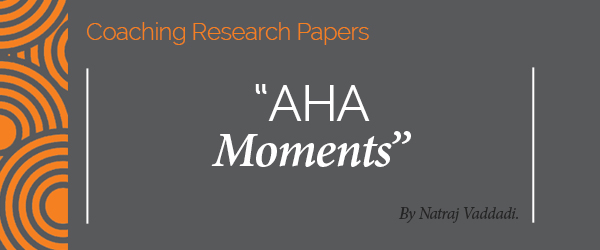A Research Paper created by Natraj Vaddadi
(Performance Improvement Coach, INDIA)
The International Coach Federation defines coaching as:
Professional coaches provide an ongoing partnership designed to help clients produce fulfilling results in their personal and professional lives. Coaches help people improve their performances and enhance the quality of their lives.
Coaching is an emerging and evolving field, complex and dynamic, integrating the substance of many fields and the innovative thinking of great pioneers (Brock, 2008). Coaching has also been extensively defined as a learning process (Brock, 2008).
Coaching involves dialogue between a coach and clients with the aim of supporting the client obtain a fulfilling life. (International Coach Academy, 2002)
Coaching is a rapidly expanding field with interdisciplinary roots and broad application. However, despite abundant prescriptive literature, research into the process of coaching is minimal. (Griffiths & Campbell, 2009)
Worldwide, coaching research is being conducted in order to better understand and refine the process of coaching and thereby improve its outcomes. On a more focused note, for a coaching practitioner, the research should be able to identify the active ingredients of the process that leads to successful achievement of client goals or long term outcomes.
Successful short term and long term outcomes often start in a coaching session with the realization that the goal is achievable. Such moments generally termed as AHA moments’ usually occur during a coaching session. This AHA moment can come at any moment and could be due to any reason. While it is reported that such AHA moments occur regularly in coaching sessions, not much literature or material is available on them. In the above context, it may be important for us, as coaches, to first recognize the emergence of the AHA moments and then more importantly understand the reason for the emergence of these moments.
The Aha! Effect refers to the common human experience of suddenly understanding a previously incomprehensible problem or concept. The Aha! Effect is also known as the Eureka effect, which is named after Greek polymath Archimedes. (Wikipedia, 2102)
Interestingly researchers say Aha! moments are marked by a surge of electrical activity in the brain. It is believed, that distinct computational and neural mechanisms lead to these breakthrough moments. (Mark Jung-Beeman, 2004)
For the purpose of this study, an AHA moment is defined as the moment when the client has become aware or recognizes the fact that it is highly possible to achieve a goal that is being pursued.
SCOPE OF STUDY
The purpose of the study was to understand the reasons of AHA moments and understand the perceived role of AHA movements and their potential implications applications in improving the efficacy of coaching.
This study is expected to contribute to the larger question of – What works in coaching.
The following questions underpin the study reported in this paper:
